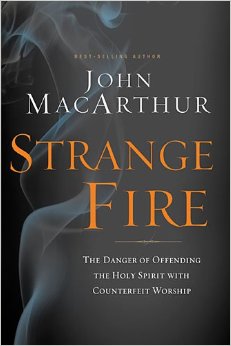John MacArthur’s Strange Fire as Parody of Jonathan Edwards’ Theology, by William De Arteaga
Introduction
The thesis of John MacArthur’s new book, Strange Fire is that Pentecostalism and the Charismatic Movement, are heretical movements that must be rebuked and eliminated from the church. 1 Everything to do with these movements is fraudulent, inauthentic or a misrepresentation of the true Gospel of Jesus Christ. Strange Fire continues his war on the Pentecostals and charismatics begun with his book published twenty years ago, Charismatic Chaos.2
In the public launch to Strange Fire, MacArthur made clear his utter disdain for the Charismatic Movement in particular:
Nothing coming from the Charismatic movement has provided recovery or strengthening of the biblical Gospel. Nothing has preserved truth and sound doctrine. It has only produced distortion, confusion, and error. Yes, there are people in the movement who know and love the truth, have an orthodox Gospel, but are heterodox on the Holy Spirit. Not all of them are heretics. But I say again the contribution of truth from the people in the movement doesn’t come from the movement, but in spite of it.3
In the introduction to Strange Fire we find this accusation about the Charismatic Movement:
In recent history, no other movement has done more damage to the cause of the gospel, to distort truth, and to smother the articulation of sound doctrine. Charismatic theology has turned the evangelical church into a cesspool of error and a breeding ground for false teachers (pxvii).
The Rev. MacArthur bases these judgments on his close adherence to Reformed and Calvinist theology, and especially the doctrine of cessationism. This doctrine holds that the gifts of the Spirit, as described in Epistles and the Book of Acts, disappeared with the death of the Apostles or shortly after. Thus, in MacArthur’s mind, any manifestations of the gifts of the Spirit in the present must be of a fraudulent nature.
Strange Fire is divided into three parts. Part One critiques both the origins and the workings of the Pentecostal and charismatic movements as counterfeit revivals. Part Two focus on four areas of Pentecostal/charismatic ministry that MacArthur feels are especially fraudulent: the contemporary ministry of prophecy, the healing ministry, the act of speaking in tongues, and the recovered apostolic office. In Part Three MacArthur presents what he deems to be the proper work of the Holy Spirit as salvation, sanctification, and illumination of the Scriptures—the traditional Reformed understanding of the Holy Spirit’s work. This part ends with an open letter to Pentecostal/charismatics, which he calls “continuationists,” urging them to repent of their folly and return to the authentic, i.e., his Reformed and cessationist, form of Christianity.
I wish to make clear in this critique of Strange Fire that I consider that MacArthur’s biblical analysis is often excellent. His methodology of interpreting Scripture with Scripture can often be very insightful. His analysis of the Old Testament seems to be consistently of a high quality, and his radio program Grace to You has blessed millions.
But now I must say that Strange Fire is a deeply flawed book. It is an unintended and woeful parody of Jonathan Edwards’ standards of discernment which MacArthur cites, but fails to apply. Strange Fire, like his previous work of twenty years ago, Charismatic Chaos, is deeply Pharisaic in content, theology and tone. I use the term Pharisaic in its biblical meaning. That is, it is a religious perspective that is orthodox in essential doctrines, but flawed in discerning the present activity of the Holy Spirit.
Biblical Definition of Phariseeism
The Pharisees in the New Testament were a faction that had their theology right. They believed in the truthfulness of the Scriptures, in angels, and in the resurrection of the dead—all things that passed on and were affirmed in Christianity. This was in contrast to another Jewish faction, the Sadducees, who disdained those beliefs. Jesus took sides on this and affirmed the Pharisees’ theology:
Then Jesus spoke to the crowds and to His disciples, saying: “The scribes and the Pharisees have seated themselves in the chair of Moses; therefore all that they tell you, do and observe, but do not do according to their deeds; for they say things and do not do them” (Matt. 23:1-3, NIV).
Their great error was not in scriptural understanding or interpretation, but in discerning the motions of the Holy Spirit in the present. They did not expect or understand that the Holy Spirit could function outside of their group, or in a manner they were not accustomed to. Specifically, they interpreted Jesus’ “signs and wonders” as originating with the power of Beelzebub (Mark 3:22). The Pharisaical perspective is one that is strong on issues that are clear in Scripture and covered by tradition, but almost paralyzed when an issue arises that is not discussed in traditional theology—or threatens their perceived monopoly as “religious experts.”
Category: Spirit, Winter 2014



